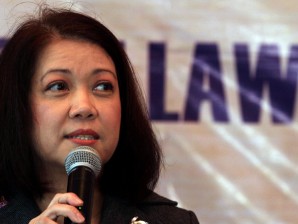At her second flag-raising ceremony since becoming head of the judiciary on August 25, Chief Justice Maria Lourdes Sereno on Monday found herself with a dwindling number of supporters among her colleagues on the Supreme Court.
Seven senior associate justices—Antonio Carpio, Teresita Leonardo-De Castro, Diosdado Peralta, Lucas Bersamin, Arturo Brion, Presbitero Velasco Jr. and Martin Villarama Jr.—boycotted her first flag-raising ceremony on September 3.
The reason was obvious to Malacañang: The most senior justices were protesting President Benigno Aquino’s passing the junior Sereno over their heads and making her Chief Justice, a breach of the tradition on the court that the next most senior justice replaces the retiring head of the judiciary.
Malacañang chose to ignore the justices’ protest and said the President would not explain Sereno’s appointment to them. Instead, the Palace asked the court to give Sereno a chance to lead reforms in the judiciary.
Did the justices listen?
On Moday, eight associate judges—Carpio, Velasco, De Castro, Brion, Peralta, Bersamin, Jose Perez and Estela Perlas-Bernabe—absented themselves from Sereno’s flag-raising ceremony.
Only five—Associate Justices Roberto Abad, Mariano del Castillo, Jose Catral Mendoza, Bienvenido Reyes and Villarama—appeared with Sereno at the flag rites on the Supreme Court grounds on Padre Faura Street in Manila.
No talk
Sereno, who had never become a judge before President Aquino appointed her to serve on the Supreme Court in 2010, said nothing about the snub.
She had said she wanted to restore the court’s venerable silence, leaving public communication to the tribunal’s press officer.
Press officer Gleoresty Guerra had nothing to say Monday about the increasing absences at the flag-raising ceremony.
But Abad told reporters that the Sereno court was moving on after the impeachment of Corona and the intense rivalry among the justices nominated to replace the fired Chief Justice.
Abad himself was among the five justices who accepted their nominations for the top job in the judiciary.
Good relations
Asked by reporters how Sereno was doing at her new job, Abad replied, “She is doing pretty well.”
Reports are that the senior justices refuse to recognize Sereno, who was ranked 13th in seniority but accepted her nomination, as Chief Justice.
There are also reports that the senior justices are avoiding Sereno at breakfast or lunch during full-court sessions.
Abad shrugged off reports of friction among the justices, describing Sereno’s relations with the other justices as “very good.”
“We do our work. It’s something you should credit the members of the court for,” Abad said. “We do our duties. We move on.”
Senator Francis Escudero, a member of the Judicial and Bar Council (JBC) that vetted the nominees for Chief Justice, said he hoped the other justices on the Supreme Court would help Sereno in her new job.
Broken tradition
Escudero said that for him, the question about Sereno’s reported low score in the psychological exam required by the JBC should be dropped because a new Chief Justice had already been appointed.
“This is an issue that arose from the issue of appointment or nonappointment of a particular person as Chief Justice,” he said without elaborating, though it was clear he was referring to Carpio, the most senior justice and who should have been appointed to the highest office in the judiciary had the President respected tradition.
“That issue is over and I hope they will help the current Chief Justice,” Escudero said.
